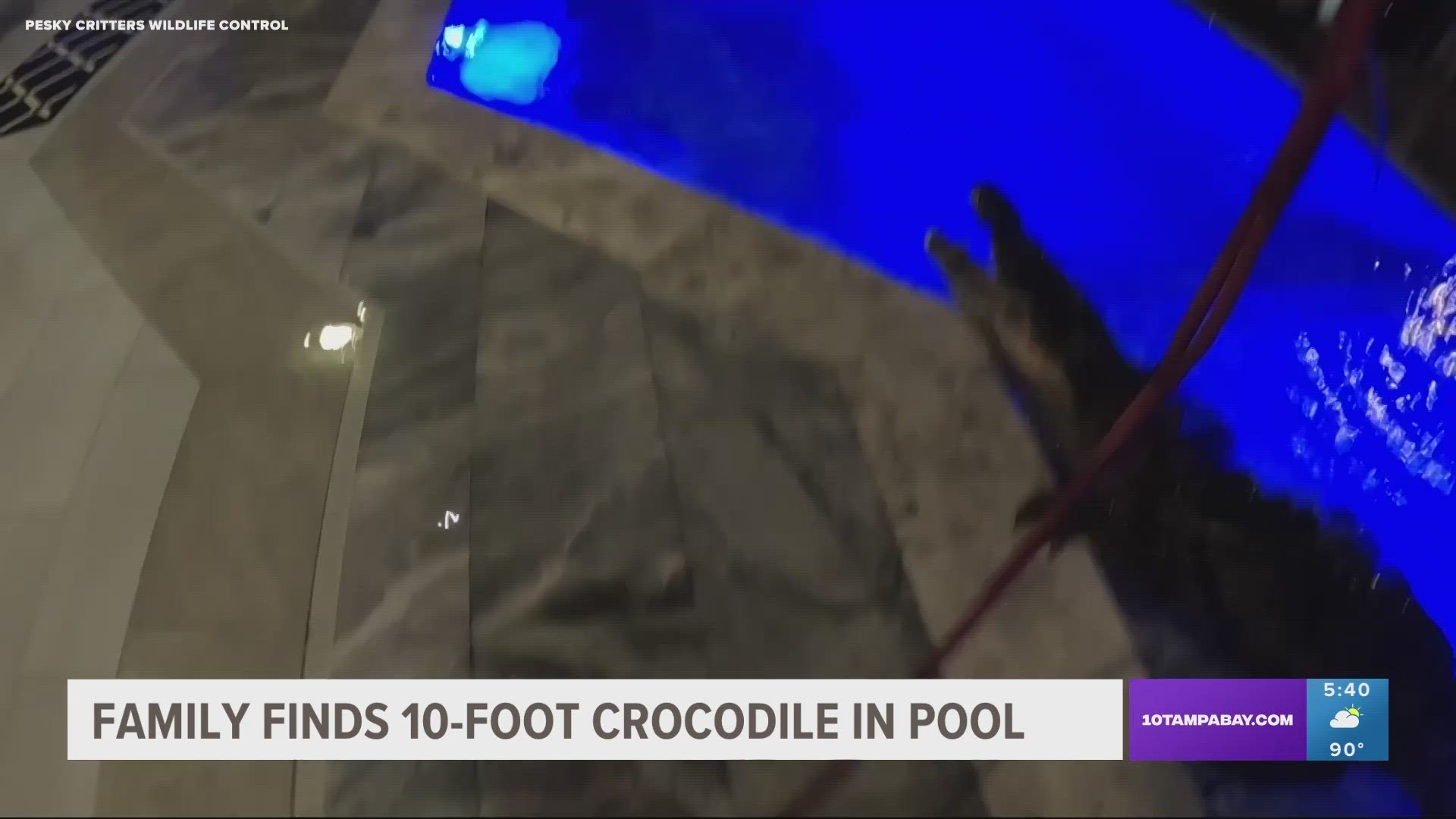Trappers with Pesky Critters Wildlife Control responded to a call from a homeowner and immediately got to work.
MONROE COUNTY, Fla. — A Florida family likely didn't expect an early-morning visitor to take a dip in their swimming pool — especially not a 10-foot American crocodile.
Wildlife officials received a call around 2 a.m. Sunday from the homeowner in Plantation Key, at about mile marker 90, about the big reptile going for a dip, according to a Facebook post from Pesky Critters Wildlife Control.
Trappers with Pesky Critters responded to the call and immediately got to work.
Video from the pool deck shows wildlife trapper Todd Hardwick quickly securing the scaley friend even after its massive splashes created a slick and dangerous footing situation.
Hardwich was able to heave the animal onto the deck with the help of assistant trapper Jeff Peterla. This is when a deputy with the Monroe County Sheriff's Office helped them to move the crocodile to a safe location for release.
The animal can be seen being released from its restraints by Hardwick before crawling away into a body of water after a small nudge.
"Crocodiles are a threatened species in Florida, and endangered everywhere else in the United States," the Facebook post read, in part.
Pesky Critters wrote out some tips for safely coexisting with these specific reptiles, including:
- Keep a safe distance if you see a crocodile. Be aware that crocodiles often will bask with an open mouth to regulate their body temperature, and there’s no cause for concern if you see this behavior.
- Swim only in designated swimming areas and only during daylight hours. Crocodiles are most active between dusk and dawn.
- Keep pets on a leash and away from the water, even designated swimming areas, because they can resemble the crocodile’s natural prey.
- Pet owners who live on the water where American crocodiles may occur should consider erecting fencing on their property that effectively places a barrier between their pets and crocodiles.
- Never feed crocodiles – it is illegal and dangerous. When fed, they can overcome their natural wariness and learn to associate people with food.
- Dispose of fish scraps in designated waste containers because discarding scraps in the water may attract them. Also, avoid feeding other aquatic animals such as ducks because that also can attract crocodiles.
People with concerns about alligators or crocodiles in their area can all the Florida Fish and Wildlife Conservation Commission at 866-392-4286.
CRIKEY! That's a CROCODILE! At 2am Sunday, June 11, 2023 wildlife officials received a call from a homeowner in Plantation Key at Mile Marker 90 about a MASSIVE 10ft american crocodile in their pool. Pesky Critters Wildlife Control trappers were dispatched to fulfill their role as FWC Crocodile Agents. Expert wildlife trapper Todd Hardwick quickly secured the crocodile, even after it's massive splashes created a slick and dangerous footing situation on the pool deck. He and assistant trapper Jeff Peterla heaved it onto the deck where a Monroe county officer ( MCSO - Florida Keys ) then assisted them with moving it to a safe location for release. Footage shows Todd Hardwick removing it's restraints once relocated and gently but safely encouraging it back into it's habitat. Crocodiles are a threatened species in Florida, and endangered everywhere else in the United States.
Tips For Safely Coexisting With Crocodiles:
-Keep a safe distance if you see a crocodile. Be aware that crocodiles often will bask with an open mouth to regulate their body temperature, and there’s no cause for concern if you see this behavior.
-Swim only in designated swimming areas and only during daylight hours. Crocodiles are most active between dusk and dawn.
-Keep pets on a leash and away from the water, even designated swimming areas, because they can resemble the crocodile’s natural prey.
-Pet owners who live on the water where American crocodiles may occur should consider erecting fencing on their property that effectively places a barrier between their pets and crocodiles.
-Never feed crocodiles – it is illegal and dangerous. When fed, they can overcome their natural wariness and learn to associate people with food.
-Dispose of fish scraps in designated waste containers because discarding scraps in the water may attract them. Also, avoid feeding other aquatic animals such as ducks because that also can attract crocodiles.
So how can you identify a crocodile?
-Grayish green on its back
-If present, dark stripes on tail and body
-Fourth tooth on lower jaw exposed when mouth is closed
-Narrow tapered snout (v shape)
If you're concerned about a crocodile, call 866-392-4286 (866-FWC-GATOR). FWC staff will offer educational information about safely living with crocodiles. If warranted, a site visit may be done to evaluate the location and behavior and determine a course of action.
Posted by Pesky Critters on Sunday, June 11, 2023

